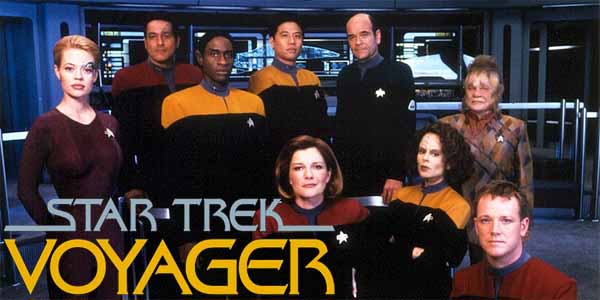
A couple years ago, I wrote about the show that I wish Star Trek: Enterrpise had been. Enterprise completely dropped the ball as a prequel and as a bridge between our time and the time of the original Star Trek, by screwing up at fundamental levels of its conception and design. But Enterprise wasn't the first Star Trek series to do this. Its immediate predecessor, Star Trek: Voyager had already started this trend, which has sadly carried onto into all incarnations of Star Trek since.
I rarely talk much about the reasons that I think Voyager is an inferior show to Next Generation and Deep Space Nine. The closest I've come so far was my rant about the Borg, a brief retrospective as part of the 50th anniversary, and a few off-hand jabs at Voyager in some of my other Star Trek posts. This past summer, Steve Shives published a video on Youtube called "What's My Problem with Voyager?" in which he vents some of the same complaints that I have. Steve has some pretty excellent content on his channel, and I highly recommend checking him out if you enjoy my Star Trek content. Anyway, his video inspired me to vent some of my own frustrations with Voyager that he either didn't cover, or for which I feel I have additional insight.
Steve Shives, creator of "Trek, Actually", posted his problem with Voyager on Youtube.
Just like Steve, I want to start by stressing that I don't hate Star Trek: Voyager. I don't think it's as good as its predecessors, but it's perfectly watchable.
When I first started drafting this, it was going to be a short list of complaints. However, as I re-watched the show, the post ballooned with examples. As such, I'm going to split this into several parts. This first part will probably be the longest (so bear with me please) and will focus on what I perceive as a failure of Star Trek: Voyager to adequately build upon the foundations of its premise. The next post will be about how I perceive Voyager as a lazy copycat of The Next Generation.
At a conceptual level, Voyager begins with two foundational pillars: the ship is stranded on the opposite end of the galaxy; and a quarter of the crew has been replaced by Maquis freedom fighters and terrorists instead of trained Starfleet personnel. The show almost completely whiffs on both of these concepts. I would say that there are also two other foundational pillars of the show, but each of these only lasts for half the series. In the first half of the series, a major source of conflict is the fact that Voyager possesses technology far superior to the races and civilizations that it encounters; thus, bringing the Prime Directive into sharp focus and testing the crew's resolve to obey the Directive in such desperate circumstances. In the second half of the series, we have the Borg (which I will be discussing again).
Voyager is isolated and alone, without the resources of the Federation or a starbase.
All four of these are very strong concepts and well worth exploring. Unfortunately, Voyager almost completely abandons its two initial foundations, and (again) completely whifs when it comes to the Borg (though, admittedly, a big part of that is Star Trek: First Contact's fault). The only concept that Voyager really sticks the landing on is the idea of technological disparity between Voyager and its foes in the first couple seasons. [More]
f844da9a-60ad-4a3a-b28a-f06121578938|5|1.8
Tags:Star Trek, Star Trek: Voyager, Star Trek: Enterprise, U.S.S. Voyager, Delta Quadrant, Starfleet, Maquis, Kazon, Hirogen, Borg, Kathryn Janeway, Seven of Nine, Jeri Ryan, The Doctor, Kes, Chakotay, Tuvok, Neelix, Tom Paris, B'Elanna Torres, Harry Kim, Joe Carey, Lyndsay Ballard, Ensign Jetal, Borg Queen, Gilligan's Island, Prime Directive, Steve Shives
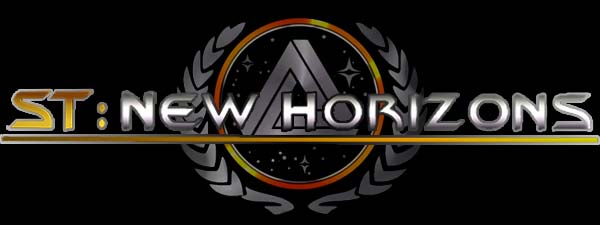
Here's something that I've never done before: a review of a game mod! I don't play mods very often. When I play games, I usually want to play the game that the creators created in order to get a feel for what their intent might have been. For some of the more sandboxy PC games that I play (like Cities: Skylines or the like), I might try some small mods.
There has yet to be an official game quite like Microprose's 1999 release, Birth of the Federation.
For this one instance, however, I'm making an exception because this particular mod fills a very specific niche desire for me that has gone unfulfilled for around 15 or 20 years. The "New Horizons" mod for Stellaris is finally allowing me to play a full 4-x strategy game set in the Star Trek universe. I haven't been able to do that since Star Trek: Birth of the Federation, developed by Microprose for Windows 98!
The creators seem to have been inspired by BotF.
Yes, there have been other Star Trek mods for other games in the past, and there's even some community projects to create spiritual successors to Birth of the Federation (such as Star Trek: Supremacy). The problem is that I've yet to ever see one of these get finished. "New Horizons" for Stellaris is still a work-in-progress, but it is mostly functionally complete and fairly robust. Since Birth of the Federation holds such a special place in my heart, I'm going to take a stab at reviewing "New Horizons" and see how it compares to my personal favorite [official] Star Trek game of all time.
Built on the back of Stellaris
"New Horizons" is, of course, a mod for the PC game Stellaris (developed and published by Paradox). Because of this, it takes advantage of most of Stellaris' strengths, but it is also hamstrung by many of Stellaris' faults.
"New Horizons" makes excellent use of the massive size and scale of Stellaris' maps by featuring a detailed recreation of the canon Star Trek galaxy, and including a surprisingly exhaustive roster of Star Trek races and factions -- all of whom are playable. Yes, of course, the big players like the Federation, the Romulans, Klingons, Cardassians, Ferengi, Dominion, and Borg are all here. As are all the expected ancillary empires like the Gorn, Tholians, Orions, and so forth.
The playable roster is surprisingly vast and exhaustive.
It doesn't end there, though. This mod also features a crap-ton of "aliens of the week" as fully-featured, playable empires. They aren't "minor races" like what we had in Birth of the Federation or the city states of Civilization V or VI. They don't just have one planet and a handful of ships just waiting for a "major faction" to conquer or absorb them. The obvious choices like the Vulcans, Andorians, Bajorans, are all there. The game also features empires like the Sheliak, Anticans, Selay, Caitian, Cheron, Dosi, Hirogen, Kazon, Krenim, Kelpian, and more! If you have a favorite space-facing civilization from any episode of Star Trek (including Gamma Quadrant aliens from DS9 and Delta Quadrant aliens from Voyager), there is a very good chance that it's a playable faction in "New Horizons"... [More]
2c39f87b-9de4-4abc-b74c-781e4f27c822|0|.0
Tags:Stellaris, Star Trek, New Horizons, Stellaris: New Horizons, mod, PC, Steam, 4x, strategy, user interface, space, exploration, war, starship, starbase, warp drive, glitch, casus belli, Star Trek: Birth of the Federation, Star Trek: the Next Generation, Star Trek: Deep Space Nine, Star Trek: Voyager, Star Trek: Enterprise, Star Trek: Discovery, Star Trek: Beyond, Star Trek II: the Wrath of Khan, Star Trek VI: the Undiscovered Country, Federation, Klingon, Romulan, Cardassian, Ferengi, Dominion, Borg, Gorn, Tholian, Orion Syndicate, Vulcan, Andorian, Tellarite, Kazon, Hirogen, Alpha Quadrant, Beta Quadrant, Gamma Quadrant, Delta Quadrant
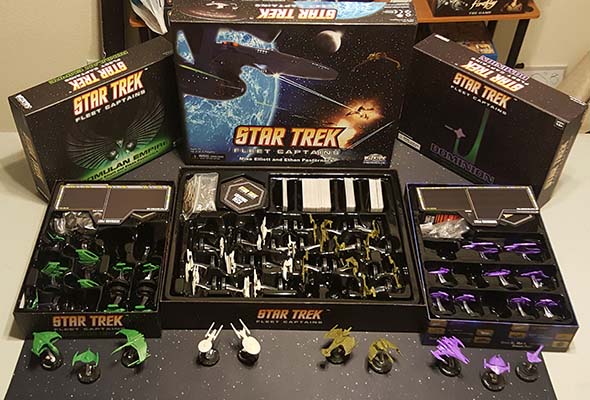
Star Trek: Fleet Captains has expansions for the Romulan Empire and Dominion.
Even though it is a kind of mediocre game, my friends and I liked Star Trek: Fleet Captains enough that we were excited to try out the game's expansions. There's a nice, episodic feel to the game that does do a pretty good job of capturing some of the feel of the source material. Fleet Captains has two expansions, which each offer a new playable faction: the Romulan Empire and the Dominion. Both expansions revolve around the same two core mechanics (espionage and saboteurs), but each has its own unique methods and techniques for how they utilize those mechanics. Since both expansions have similar features, I'm going to review both expansions together.
The Romulan Empire connives its way to victory
The Romulans are my favorite race in Star Trek I like Romulan makeup. I like their uniforms. I like their ship designs (especially the warbirds). I like their cunning. And I like the depictions of the Romulans in every era of Star Trek, except for Star Trek: Nemesis and Star Trek: Enterprise, which both managed to ruin a good thing. So opening the Fleet Captains box to find no Romulan ships was - of course - disappointing, and the very first thought that popped into my mind (after "Ooh, plastic space ships!") was "I should check if there's a Romulan expansion to this game". Sadly, it was sold out on Amazon, and eBay sellers wanted upwards of $150 for copies. I didn't want a Romulan expansion that badly... But my girlfriend, being awesome as she is, eventually saw the expansion come back in stock on Amazon and immediately ordered a copy for me to surprise me. So as I was getting ready to organize some game sessions to play the Dominion expansion and resigning myself to the idea that I'd never play the Romulans, a shiny, shrink-wrapped copy of the expansion literally showed up at my door step. She's a keeper!
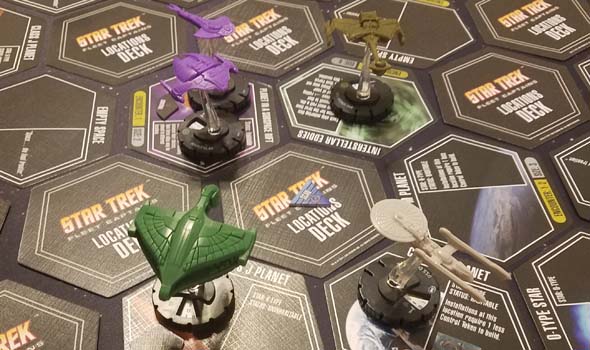
I don't like the monochrome ships, but at least the Romulan ships are the same color as in the show.
The green plastic of the Romulan ship miniatures fits well with the color schemes of Romulan ships in the shows, and the miniatures don't look as dull as the unpainted miniatures in the base game. The only Romulan ships that wouldn't be green would be Original Series Birds of Prey (or borrowed Klingon battle cruisers), which aren't included in the expansion's ship roster anyway. Instead, they included three Birds of Prey from Enterprise. That's a shame to me, since I really like the Original Series Bird of Prey's design - not as much as I like the TNG Warbird design, but the TOS Bird of Prey is up there in my list of favorite ships. I really would have liked to have seen one of the Enterprise Birds of Prey replaced with a TOS Bird of Prey in the roster, and maybe even a borrowed Klingon Battle Cruiser, but no such luck. Ah well... [More]
62e7d974-a66f-4dc9-8815-e176dc78759e|2|3.0
Tags:Star Trek: Fleet Captains: Romulan Empire, Star Trek: Fleet Captains: Dominion, Star Trek, Star Trek: Fleet Captains, board game, expansion, WizKids, Romulan, Dominion, Cardassian, Vorta, Jem Hadar, changling, shapeshifter, espionage, cloak, sabotage, defect, manufacturer defect, customer support, Star Trek: Enterprise, Mike Elliot, Ethan Pasternack
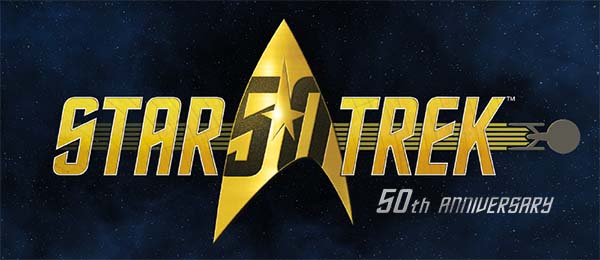
On September 8, 1966, a cultural revolution started. The first episode of a new science fiction television series named Star Trek premiered on NBC. This series broke new ground in the genre of science fiction by being one of the first series ever to present high science fiction concepts to television audiences, while also using its space adventures as allegories for contemporary social and political issues. While it presented itself as mindless space adventure in the same vein as Buck Rogers and Flash Gordon, it took a serious approach to science fiction that (at the time) was limited to literature like the novels of H.G. Wells and the stories of Isaac Asimov.
Star Trek wasn't the first serious science fiction television series. Shows like The Twilight Zone and The Outer Limits had existed for a almost a decade. But Star Trek differed from these series in that it depicted a revolutionarily positive and uplifting version of the future of humanity during the height of the paranoia of the Cold War. Humanity, according to Star Trek would overcome the threat of mutual destruction that the Cold War between the United States and the Soviet Union posed, and we would come out the other side with a spirit of cooperation and a desire to peacefully and benevolently explore the stars, exploring strange new worlds and seeking out new life and new civilizations.
Television science fiction was dominated by childish adventures like Buck Rogers
and more cynical anthology series like The Twilight Zone that drew off of Cold War paranoia.
The show was created by Gene Roddenberry, a former United States army air force pilot and Los Angeles police officer who eventually found his calling as a television writer and producer. He wrote and produced some police dramas and westerns before pitching his defining project: Star Trek. The show was picked up by Desilu Productions, a company that was run by Lucille Ball (yes, the titular actress of I Love Lucy) and her husband. The production of Star Trek was tumultuous. The show was canceled by NBC after its second season, only to be revived due to an unprecedented, fervent letter-writing campaign staged by its fans. It did not survive its third season, however, as Desilu Productions was rapidly running out of money, was forced to cut budgets, and NBC moved the show to the dreaded Friday night "death" slot. In an age before DVRs, or even VCRs, if people were out on the town on a Friday night, and they missed an episode of a show, then that episode simply went unseen.
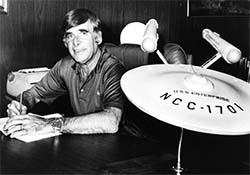
Gene Roddenberry's optimistic vision
of the future remains endearing.
The series eventually saw tremendous success after its cancellation due to its episodes being syndicated during the 1970's. It gained a cult following that grew and grew, setting up conventions that would come to draw thousands of attendees. Though not immediately apparent, Star Trek would grow to become one of (if not the) most successful science fiction properties in the world. The series is often cited by scientists, engineers, and astronauts as their inspirations for their careers, and the technology of the series has inspired many real-world technological innovations, such as wireless communication, mobile devices (in particularly mobile phones), speech-recognition software, and so on. Roddenberry became the first TV writer to receive a star on the Hollywood walk of fame, has been inducted into the Science Fiction Hall of Fame and the Academy of Television Arts & Sciences Hall of Fame, and was one of the first human beings ever to have his ashes carried into earth orbit... [More]
a36b33e8-1404-42b1-9723-a4759be0acee|2|5.0
Tags:Star Trek, Star Trek: the Next Generation, Star Trek: Deep Space Nine, Star Trek: Voyager, Star Trek: Enterprise, Star Trek: Discovery, Star Trek VI: the Undiscovered Country, Star Trek: Beyond, birthday, anniversary, science fiction, allegory, humanism, humanist, Gene Roddenberry, NBC, CBS, Fox, Paramount, Desilu Production, Lucille Ball, Cold War, Balance of Terror, The Measure of a Man, Kirk, Spock, Data, Gul Dukat, Seven of Nine, Star Trek the Experience, Las Vegas, Wallace Shawn, Grand Nagus Zek
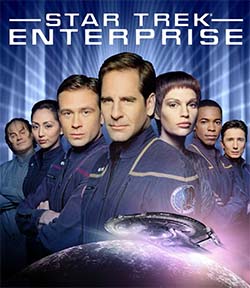
Star Trek: Enterprise is a very divisive topic among Trekkers / Trekkies. Personally, I'm not a big fan. It was a perfectly adequate space adventure TV show, but just never quite worked as hard science fiction for me, let alone as "Star Trek". There were certainly some stand-out good episodes. The haunted space station of "Dead Stop" and the mirror universe antics of "In a Mirror, Darkly" being among my favorites. The annoying thing is that the show made several mistakes at very fundamental levels before it even got off the ground. I could have lived with the show being a prequel, but the efforts to make the show seem both futuristic to the viewing audience, but also less advanced than the (then 40-year-old) original series put the show in an awkward juxtaposition with established series continuity. The hackneyed time travel meta-plot certainly didn't help.
"Juxtaposed" is an excellent way of describing Enterprise as a whole. It's a show that simultaneously seemed ashamed of its "Star Trek" name (remember, it premiered with the title "Enterprise", and "Star Trek" was only stapled back on in later seasons), while also indulging in needless - and sometimes cringe-worthy - fan service (such as the appearance of the Borg, Ferengi, and the entire episode "In A Mirror, Darkly"). It wanted to distance itself from established Trek tropes, but also brought back many of the same technologies, concepts, and character archetypes (simply renaming many of them). It set itself at the cusp of development of advanced science fiction technologies, but completely waffled when it came to telling hard science fiction stories about those technologies. It wanted to be simultaneously a prequel and a sequel via its contrived time travel premise. It was this lack of confidence and true vision that really killed this show.
The science of future technology
The show made the mistake of trying to present a Star Trek setting that was less technologically advanced, but still went ahead and gave the crew access to stand-ins for all the established trek technologies. They tried to make the Enterprise itself feel more like a contemporary submarine with its confined spaces, but it never really felt different. There was "hull polarization" instead of shields, and "phase cannons" instead of phasers. Different names, but same basic concepts that were used in exactly the same manner. The crew didn't start the show using more contemporary-seeming projectile weapons - not even a futuristic projectile weapon like a rail gun - before transitioning to purely energy-based weapons. The Enterprise didn't have to be equipped with any kind of futuristic chaffe in order to misdirect hostile targeting scanners, nor did it use point-defense to destroy incoming missiles.
"Phase pistols" and "polarized hull" were just lazy stand-ins for phasers and shields.
The only pieces of tech that the show really held off on (and were relevant to narrative) were the universal translator and transporters. The translator was rarely an issue since Hoshi was practically a Babel Fish. The transporter was there, but it was not trusted to reliably transport living things - even though it had been verified as safe by the beginning of the first episode and was successfully used in that episode. So for most of the show's run, the crew used shuttle craft for away missions, but the transporter was always there just waiting to act as a deus ex machina to get the crew out of a sticky situation (which, of course, happened on multiple occasions - including the premiere).
The fact that these technologies were already in place made the show feel too similar to other Trek series, even though it desperately wanted to feel distinct. But it also prevented the writers from exploring some of the more interesting issues inherent to the development of these technologies... [More]
da55494b-5a7b-4e89-b139-99295c419ad0|2|3.5
Tags:Star Trek, Star Trek: Enterprise, Enterprise, mirror universe, Terran Empire, Jonathan Archer, Borg, Ferengi, Xindi, time travel, xenophobia, science fiction, technology, transporter, phaser, universal translator, Heisenberg Compensators, artificial gravity, centrifugal force, space, allegory, Zefram Cochrane, Star Trek: First Contact, first contact
|

| 12 | | | | | | | 60 | | 11 | | | | | | | 55 | | 10 | | | | | | | 50 | | 09 | | | | | | | 45 | | 08 | | | | | | | 40 | | 07 | | | | | | | 35 | | 06 | | | | | | | 30 | | 05 | | | | | | | 25 | | 04 | | | | | | | 20 | | 03 | | | | | | | 15 | | 02 | | | | | | | 10 | | 01 | | | | | | | 05 |
|